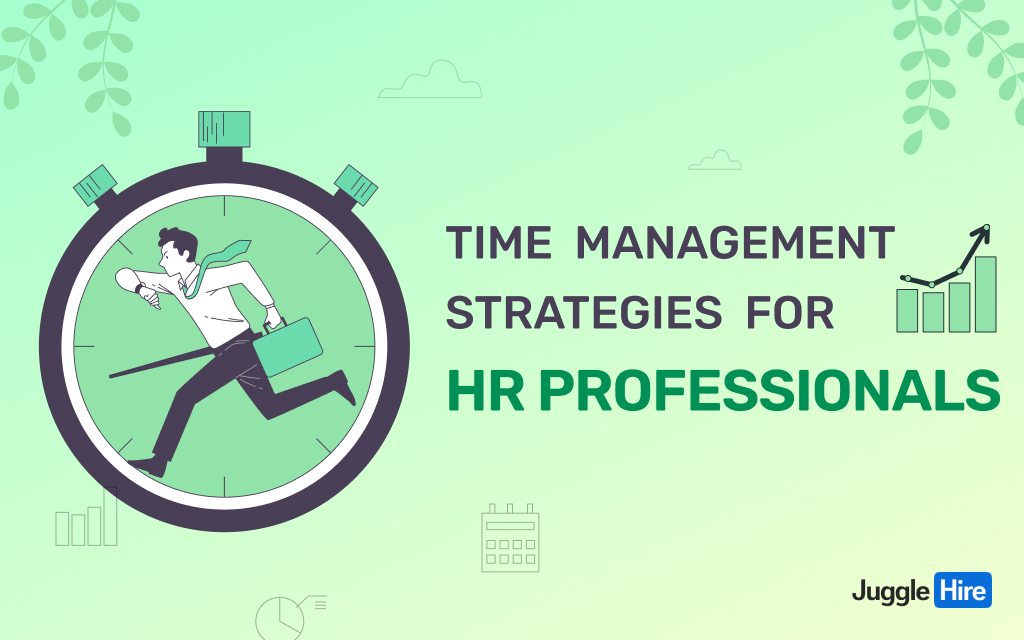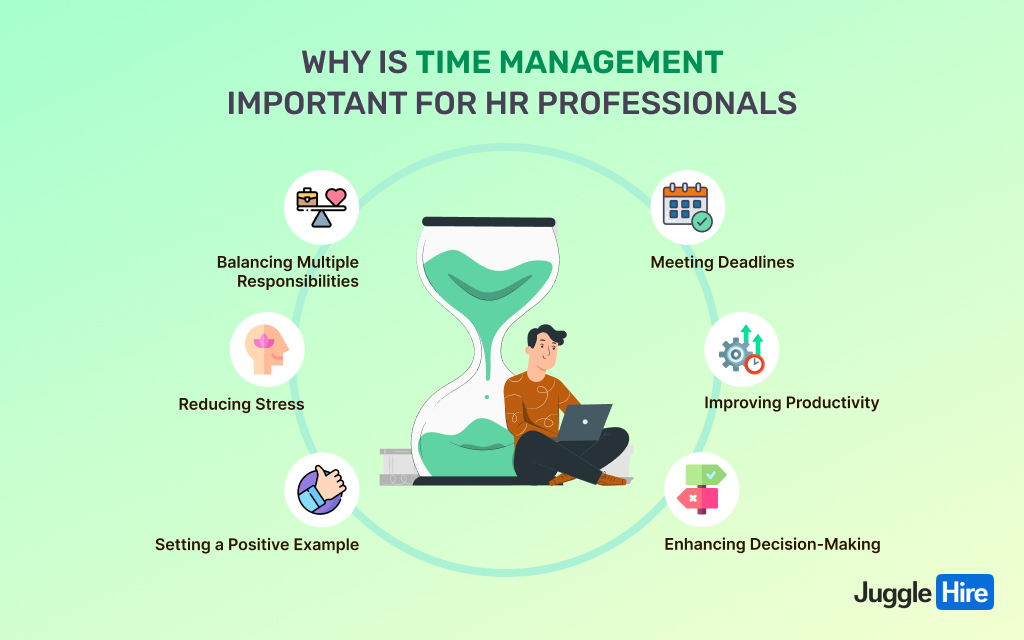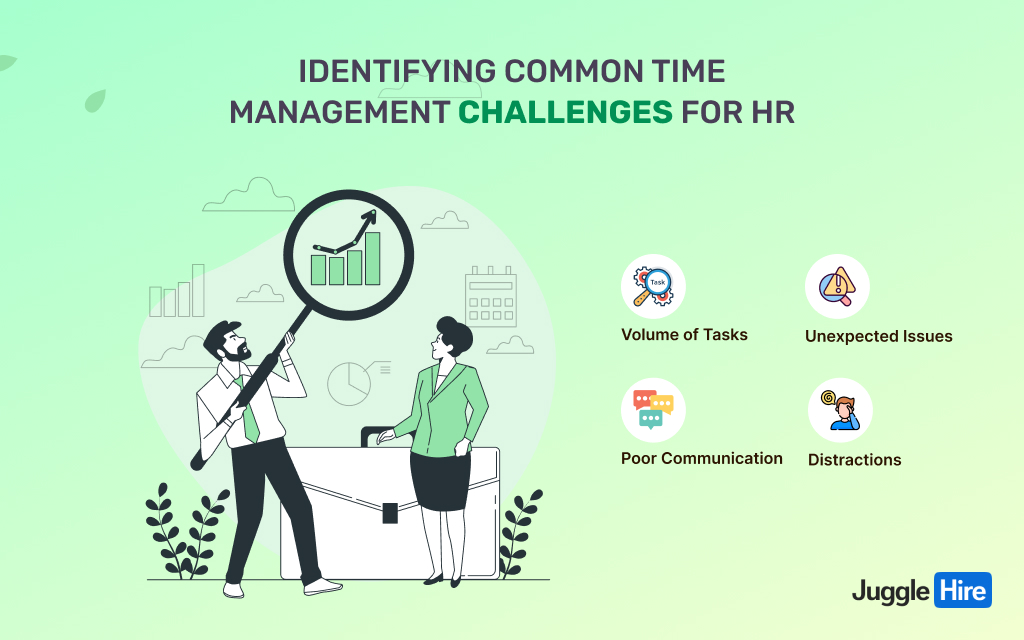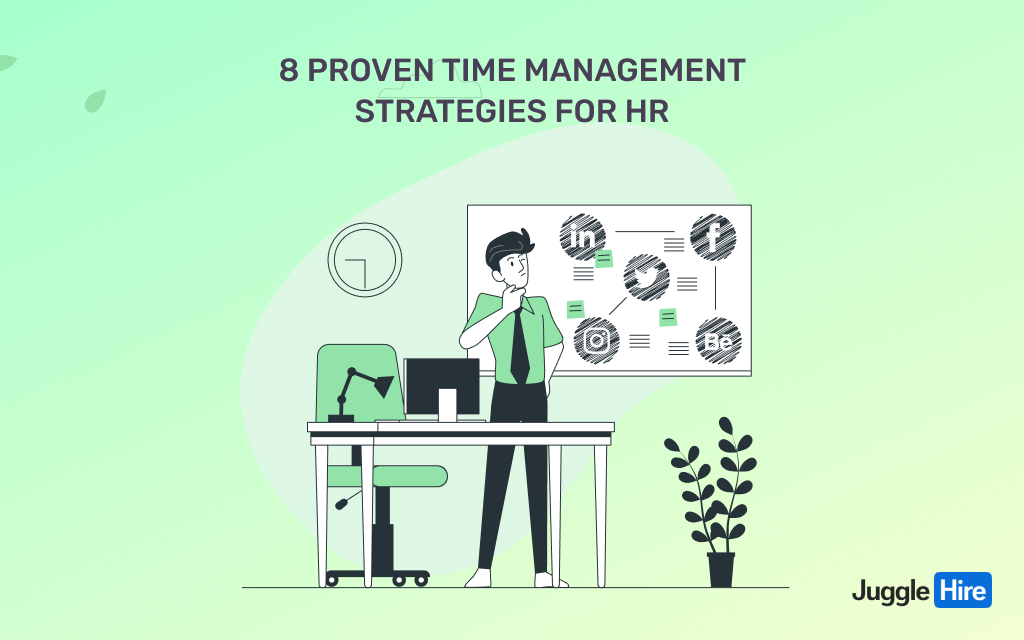8 Proven Time Management Strategies for HR Professionals

Every day, HR professionals face a mountain of tasks—from interviewing candidates to handling paperwork and resolving employee issues.
Studies show, full-time Human Resource professionals work an average of 46 hours per week in their main job. More than 33% (a third) of workers regularly work overtime or extra hours (either paid or unpaid).
With so much to do and only so many hours in the day, managing time efficiently becomes a crucial skill. Without good time management, important tasks can fall through the cracks, leading to missed opportunities and increased stress.
Recognizing the importance of this skill, we’ve prepared a guide specifically designed for HR professionals. This guide offers practical time management strategies for HR professionals and insights to help you tackle your daily challenges more effectively.
Why is Time Management Important for HR Professionals?

Time management is crucial for you as an HR professional for several reasons. Here they are:
- Meeting Deadlines: Firstly, it helps you meet deadlines. Hiring processes often have strict timelines. Managing time well ensures that positions are filled quickly and efficiently, avoiding delays in projects or operations.
- Improving Productivity: Effective time management allows you to improve your productivity. By organizing your tasks and prioritizing them, you can focus on important activities, like reviewing applications and interviewing candidates, without getting overwhelmed.
- Enhancing Decision-Making: Good time management leads to better decision-making. As a HR professional who manages your time well, you can dedicate enough attention to each candidate, ensuring you select the most suitable ones for the job. This reduces the risk of costly hiring mistakes.
- Balancing Multiple Responsibilities: Time management is essential for balancing multiple responsibilities. You often juggle various tasks, from posting job ads to conducting background checks. Proper time management helps you handle these tasks without compromising quality.
- Reducing Stress: Time management contributes to stress reduction. Hiring processes can be high-pressure situations. By effectively managing your time, you can reduce your stress levels, leading to a more pleasant work environment and better overall well-being.
- Setting a Positive Example: Time management skills allow you to set a good example for your team. By managing your time efficiently, you demonstrate the importance of organization and planning, encouraging your team to adopt similar practices.
In summary, time management is important for you as an HR professional because it helps you meet deadlines, improve productivity, make better decisions, balance multiple tasks, reduce stress, and set a positive example for your team.
Identifying Common Time Management Challenges for HR

Identifying your common time management challenges as an HR professional is important. Here are the common challenges HR Professionals face every day:
- Volume of Tasks: One big challenge is the volume of tasks. You often have too many tasks. This includes interviewing candidates, doing paperwork, and answering employee questions. It can be hard to do everything well.
- Unexpected Issues: Another challenge is unexpected issues. Sometimes, sudden problems like conflicts between employees or urgent hiring needs can disrupt your planned schedules. This makes it tough to manage your time.
- Poor Communication: poor communication can waste your time. When instructions or job descriptions are not clear, you may need to spend extra time fixing misunderstandings. This can slow down your work.
- Distractions: Distractions are another problem. Emails, phone calls, and questions from employees can interrupt important tasks. This makes it hard for you to focus and finish your work quickly.
8 Proven Time Management Strategies for HR

To manage your time well, it’s important to use strategies that work. Here are 8 proven time management strategies for HR professionals hods that can help them make the most of their time.
1. Prioritization Techniques
One of the best ways to manage your time is to prioritize your tasks. Knowing which tasks are most important helps you focus on what really needs to be done first.
Eisenhower Box
This is a simple but effective way to decide on what task to do first. You draw a big square and divide it into four smaller squares. Each square gets a label: one is for things that are important and need to be done right away. Another is for important things that can wait a bit.
A third is for things that are urgent but not so important. And the last one is for tasks that are neither urgent nor important. This helps HR professionals focus on tasks that really matter, reducing time spent on less critical activities.
ABCD Prioritization
This method asks you to look at your to-do list and mark each task with a letter. ‘A’ is for tasks that are very important. ‘B’ is for important tasks but not as much as ‘A’. ‘C’ tasks are nice to do but not essential. ‘D’ tasks are least important.
This method makes sure HR professionals work on the most critical tasks first, ensuring the most impactful tasks are completed in a timely manner.
2. Leveraging Technology
Technology can be a big help for HR professionals. There are many computer programs and apps designed to make HR tasks easier and quicker. For example, there are tools for scheduling interviews so you don’t have to go back and forth in emails to find a good time.
There are also systems for keeping track of all the paperwork and information about employees, which saves a lot of time compared to doing it all on paper. Using these technologies means HR professionals can spend less time on administrative tasks and more time on things like planning and strategy.
3. Effective Delegation
Delegation means giving some of your work to other people. It’s important for you to pick the right tasks to delegate. These should be tasks that someone else can do well, freeing you up to focus on tasks that require your specific skills and experience.
For example, you might delegate the task of organizing files or updating employee records to an administrative assistant. This frees you up to focus on more complex tasks like strategizing on workforce development or dealing with employee relations issues.
Another example is delegating the initial screening of job applications to a junior HR team member, allowing you, the senior HR professional, to concentrate on interviewing finalists and making final hiring decisions. Clear instructions and trust in the team’s abilities are key to your effective delegation.
It’s also crucial for you to clearly explain what needs to be done so the task is completed correctly. Effective delegation helps spread the workload, making sure you aren’t overwhelmed while also developing the skills of the wider team.
Also Read: Remote Hiring Tips: How To Attract, Hire and Retain Remote Employees
4. Setting Realistic Deadlines
When setting deadlines, you should make sure those deadlines are realistic. This means thinking carefully about how long tasks actually take and adding some extra time just in case things don’t go as planned. Setting deadlines that can be met reduces stress and increases the chances of tasks being completed well.
For instance, if you need to implement a new employee onboarding process, instead of setting a deadline for completing the entire project in one month, which might be unrealistic due to unforeseen issues, you could set smaller, more manageable deadlines.
For example, you might aim to have the onboarding plan drafted in two weeks, feedback collected in another week, and the final implementation ready in the fourth week.
This approach helps in planning your day or week more effectively, ensuring that there’s enough time for both expected tasks and any unforeseen issues that may arise.
5. Implementing a Time Audit
A time audit means tracking how you spend your time at work. For one week, you might write down everything you do and how long each task takes. This shows where you spend most of your time. You might find you’re spending too much time on emails or meetings.
With this information, you can make changes to use your time better. For example, you might decide to spend less time on emails and more on planning HR strategies.
6. Streamlining Communication
Streamlining communication means making talking and sharing information easier and faster for you. You can do this by using one tool for messages instead of many different ones. You can also set clear rules for communication, like using emails for important messages and instant messages for quick questions.
This saves time because everyone knows the best way to share information and doesn’t waste time choosing how to communicate or looking through different platforms for messages.
7. Fostering a Culture of Productivity
Creating a culture of productivity means making a work environment where everyone wants to do their best. You can lead this by setting good examples, like finishing tasks on time and managing your time well.
You can also offer training on time management for employees. Rewarding teams for efficient work is another way to encourage productivity. This creates a workplace where everyone tries to work smarter, not harder.
8. Continuous Improvement
Continuous improvement means always looking for ways to do things better for you. You might do this by regularly asking for feedback on the HR processes from employees and managers. You could also keep up with new tools and methods in HR to make work easier.
Every few months, you can review your time management strategies to see what’s working and what’s not. This helps you stay efficient and effective in your role, adapting to new challenges and opportunities.
The Role of Technology in Enhancing HR Time Management
The role of technology in enhancing HR time management is very important. Technology helps you, as an HR professional, do your jobs faster and better. For example, software can help with organizing interviews. Instead of calling or emailing back and forth to find a time, the software shows when someone is free. This saves a lot of time.
Another way technology helps is by keeping track of all the information about employees. Instead of using paper files, which can be lost or hard to find, digital records are easy to search and update. This makes tasks like updating employee information or finding specific documents much faster.
Technology also helps you learn about new laws and rules. There are online courses and webinars that they can watch when you have time. This means you can stay up-to-date without having to travel to conferences or seminars.
Online tools for feedback, like surveys, make it easier to understand what employees need or want. You can use this information to make the workplace better. Before, collecting this information would take a lot of time, but now it can be done quickly online.
Also, technology can help with planning and strategy. There are tools that can analyze data about things like how many people leave the company and why. This helps you make better plans to keep employees happy and reduce turnover.
Recruitment software can significantly enhance the efficiency of hiring processes. You can consider recruitment softwares like JuggleHire . It streamlines tasks such as sorting through applications, managing interviews, and communicating with candidates. This not only saves considerable time but also improves the quality of hires. It ensures no potential candidate is overlooked due to manual oversight.
In summary, technology plays a big role in improving time management for HR professionals by making communication, information management, learning, feedback collection, and strategic planning more efficient.
Also Read: Applicant Tracking System Best Practices: 12 Tips for Small Businesses
Time Management Strategies for HR Professionals: Wrapping Up
To wrap up, good time management strategies for HR professionals are key.
By using the time management strategies for hr we’ve shared, like planning, sharing work, and using tech, you can get more done and feel less stressed. It’s all about doing the right things at the right time.
Keep learning and trying new ways to be better at managing your time. This guide is just the beginning. Use it to make your workday smoother and your job more enjoyable.
